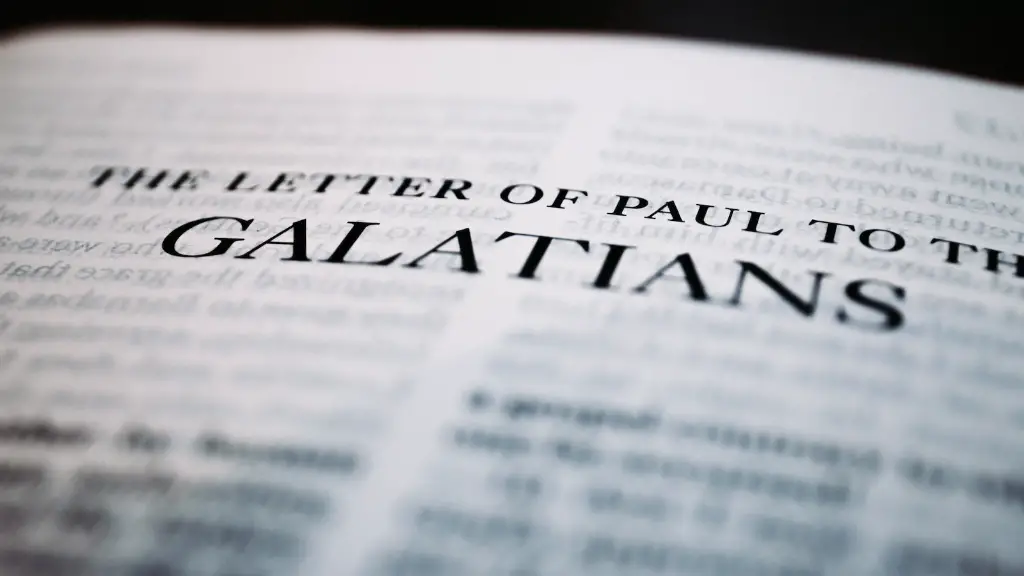Is Easter mentioned in the Bible? This is a question often asked by Christians and others alike, especially those of us who celebrate the feast of Easter annually. The word ‘Easter’ itself doesn’t appear in the Bible, however, the events that we celebrate during the season are mentioned in the Old and New Testaments. This is something that has been noted by theologians and bible scholars for centuries, yet its importance and meaning has been debated.
The Bible verse that many use to explain the significance of Easter is Leviticus 23:5-6 which reads, “In the fourteenth day of the first month at twilight is the Lord’s Passover. And on the fifteenth day of the same month is the feast of unleavened bread to the Lord; seven days you must eat unleavened bread.” This particular bible passage has been interpreted as a reference to Jesus’ resurrection. It has been suggested that the ‘Passover’ mentioned in the bible was actually in reference to the death of Jesus on the cross.
Another commonly cited bible verse is Luke 24:1-7; “On the first day of the week, very early in the morning, the women took the spices they had prepared and went to the tomb. They found the stone rolled away from the tomb, but when they entered, they did not find the body of the Lord Jesus. While they were wondering about this, suddenly two men in clothes that gleamed like lightning stood beside them.” This passage has been seen as a reference to Jesus’ resurrection, as the resurrection is said to have occurred on the first day of the week.
Furthermore, the book of Matthew, chapter 28:1-7, states; “After the Sabbath, at dawn on the first day of the week, Mary Magdalene and the other Mary went to look at the tomb. There was a violent earthquake, for an angel of the Lord came down from heaven and, going to the tomb, rolled back the stone and sat on it. His face was like lightning, and his clothes were white as snow.” This passage is seen as the biblical evidence of the resurrection of Christ.
Aside from the bible verses that reference the resurrection and resurrection-related events, there are several other significant events and activities that are associated with Easter. For example, the period leading up to Easter is also known as Lent, a time for fasting and reflection for many Christians. During this season, people tend to focus on preparing for Easter and the celebration of the resurrection, through prayer and meditation.
In addition, many churches extend the Easter season to 40 days, known as the Easter Triduum. During this period, members of the church focus on various activities such as praying, worshipping, reflecting and giving thanks. They commemorate Jesus’ passion and suffering during Lent, culminating in the joyous celebration of his resurrection from the dead.
Finally, the Christian Easter season is typically celebrated with special Easter services, music and meals. People who celebrate Easter also recognize the exchange of symbolic eggs and baskets as a way to commemorate Jesus’ resurrection and celebrate new life. These traditions have been part of Easter celebrations for centuries, with the eggs symbolizing Jesus’ victory over death and the resurrection.
Significance Of Easter
The resurrection of Christ is seen as the most important event in the history of Christianity and marks the culmination of Jesus’ mission to redeem humanity from the punishment of sin incurred by the fall of Adam and Eve. The resurrection signifies the second birth of Jesus, which marks the end of death, and the hope of eternal life. His resurrection is seen by Christians as evidence of God’s commitment to save humanity and make them His own.
Christians also see resurrection as a symbol of the ultimate hope of believers in the promise of the Second Coming of Christ. According to Christian doctrine, those who believe in Jesus Christ as Lord and Savior will be resurrected and have eternal life in His glorious presence. In this way, Easter has great meaning and significance for all believers. It provides hope for those who have lost loved ones, and is a reminder of the triumph of Jesus over death.
Christians pray on Easter to recognize the resurrection of Jesus and celebrate new life through Him. There are meditation services, bible readings and prayers that take place throughout the Easter season. The celebration of Easter emphasizes the core belief of Christianity, which is believing in Jesus’ death, resurrection and ultimate victory over death and destructive forces.
Evolution Of Easter Celebration
Easter is believed to have been celebrated as early as 2nd century, however, it was not until the 4th century that Easter became a distinct Christian feast. The early church proclaimed Easter as the primary Christian holiday and placed it over other festivals such as the Jewish Passover. This was done to designate Easter as a unifying event for all Christians, regardless of their culture or ethnicity.
During the first four centuries, Easter was celebrated with prayers, fasting and preparation for baptism. In the 5th century, political leaders began to promote the celebration of Easter among their subjects and it began to resemble the feast seen today. The secular nature of the Easter holiday began to take shape in the Middle Ages with the introduction of Easter eggs and Easter bunnies. These symbols were adopted from pagan spring festivals and are still used today.
In the 16th century, Protestant reformers such as Martin Luther and John Calvin challenged traditional Catholic teachings and practices, which led to a reinterpretation of Easter and other Catholic practices. As a result, Easter is now celebrated as a hybrid holiday of both religious and secular traditions. In addition to the traditional fasting, prayers and bible readings, the season is now marked by attending church services, exchanging gifts and attending special events.
Importance Of Easter
The celebration of Easter provides an opportunity for Christians to celebrate the life and death of Jesus on the cross and His resurrection. Easter is seen as a hopeful event that signals a new beginning and a time of renewal and forgiveness. It is a reminder of the death of Jesus in exchange for the eternal life He provides us.
For Christians, Easter is a time to celebrate the miracle of Jesus’ resurrection and redemption. It is a season of joy and happiness and Christians around the world strive to understand the meaning of Easter and its significance in the Christian faith. Easter is also a time to contemplate on the incredible and powerful act of love demonstrated by Jesus.
For many, Easter is filled with exciting traditions that bring joy, hope, and fellowship. The Easter season is a reminder of God’s never ending love and mercy towards us all. In addition to being a religious holiday, it is a time to be with family and friends, to create new memories and to look forward to the new life and hope that comes with the start of spring.
Popularity Of Easter
Easter is one of the most widely celebrated Christian holidays. In many countries around the world, Easter is observed with great enthusiasm. In some cases, the secular celebration of Easter has become more popular and commercialized than the religious one. Easter eggs, Easter bunnies and Easter baskets have become popular symbols of the holiday.
The celebration of Easter varies from culture to culture, but many traditional celebrations involve a breakfast with family and friends, services at church, the exchange of Easter baskets, egg hunting, and special meals. Many Christians use Easter as an opportunity to celebrate with their families, to reflect on the life, death and resurrection of Jesus, and to give thanks for God’s mercy and love.
In recent years, many of the traditional Easter traditions have been combined with modern popular culture. Special Easter toys and games have become popular as well as movies, TV specials, and other forms of media. Despite this, Easter remains a special and important holiday to Christians around the world, providing an opportunity to reflect on the significance of Jesus’ death and resurrection.
Conclusion Of Easter
The answers to the question ‘Is Easter in the Bible?’ may be complex but, in short, the answer is yes. The scriptures of the Bible provide references to Jesus’ resurrection, as well as to the season of Lent and other activities associated with Easter. Even though the word ‘Easter’ itself does not appear in the Bible, Easter has become an important and joyous holiday for Christians around the world, a time for reflection, for family and for renewal.





